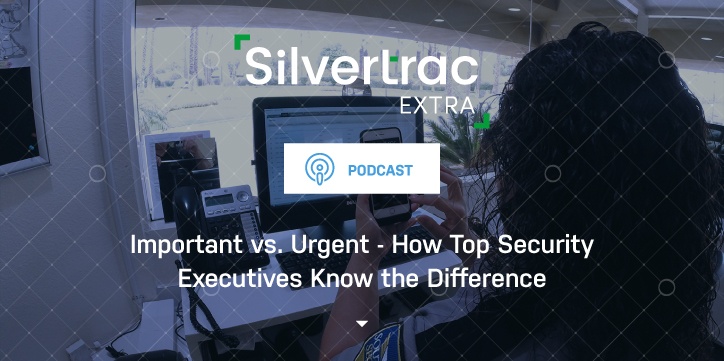The Silvertrac Extra
097: Important Vs. Urgent: How Top Security Experts Know the Difference

Owners and Operations Managers in the security industry often feel like professional firefighters. They spend their entire workday chasing down and fixing urgent problems, and when it's time to go home, they realize they haven't done anything to improve the business.
When we're in firefighting mode, it becomes difficult to distinguish between working on the business and working in the business. This is a dangerous place to be, because if we don't set aside time to work on the business, we'll never meet our goals and we'll eventually fall behind the competition.
In my job as VP of Customer Success at Silvertrac, I'm used to hearing this kind of complaint from the security professionals I talk to. They'll say things like: I know replacing the reporting system will be a major step forward for my business, but I just can't find time in the day to make it happen.
Thankfully, there are techniques you can use to get out of firefighting mode and start achieving your business goals. One of our favorites is the Eisenhower Decision Matrix, a framework supposedly used by President Dwight D. Eisenhower to determine whether items that came across his desk were important, urgent, both, or neither.
Before we get into examples, it's important to define what we mean by important and urgent.
Urgent tasks are tasks that require immediate attention, like an early morning phone call about a security incident.
Important tasks are tasks that contribute to your long-term vision and improve your business. One example is implementing new reporting software.
The Eisenhower Decision Matrix sorts tasks into four quadrants, as illustrated in this example:
Chris Anderson and I reviewed some common security industry activities and organized them into these four quadrants.
- Important & Urgent
Tasks that are both important and urgent need to be done as soon as possible. Ignoring these tasks or putting them off can have serious consequences for your business.
These include:
- Making sure payroll is submitted on time
- Meeting federal, state, and local tax deadlines
- Hiring for vacant positions to avoid becoming understaffed
- Important, but Not Urgent
This category is where we’d ideally be spending the majority of our time. Unfortunately, we often ignore these tasks in favor of more urgent ones, because of something called “present bias. As humans, we're drawn to activities that have immediate consequences. By overcoming present bias and investing more time in this quadrant, we can finally start to achieve our business goals.
These tasks include:
- Staying in touch with key clients to improve relationships
- Streamlining operations processes such as application tracking, scheduling, and reporting
- Improving marketing and looking for ways to increase referrals and sales
- Networking to pursue and strengthen relationships with referral partners
- Urgent, but Not Important
Tasks in this category are time-suckers. They are activities that appear to require our immediate attention, but won't do anything to help us fulfill our long-term vision.
Examples include:
- Talking to chatty employees
- Reading and replying to unimportant emails
- Taking calls that other people could have answered
- Doing jobs that should have been delegated to other employees
- Not Important & Not Urgent
Anything that falls into this category is considered a waste of time. One of the simplest things you can do to make your work more efficient is to cut back on these tasks as much as possible.
These include:
- Watching YouTube videos
- Checking social media
- Reading the news
By organizing work into these four categories, Owners and Operations Managers can finally escape firefighting mode. Even if you only spend 1% more time each week in quadrant 2, you will start to move the needle and improve your business.




